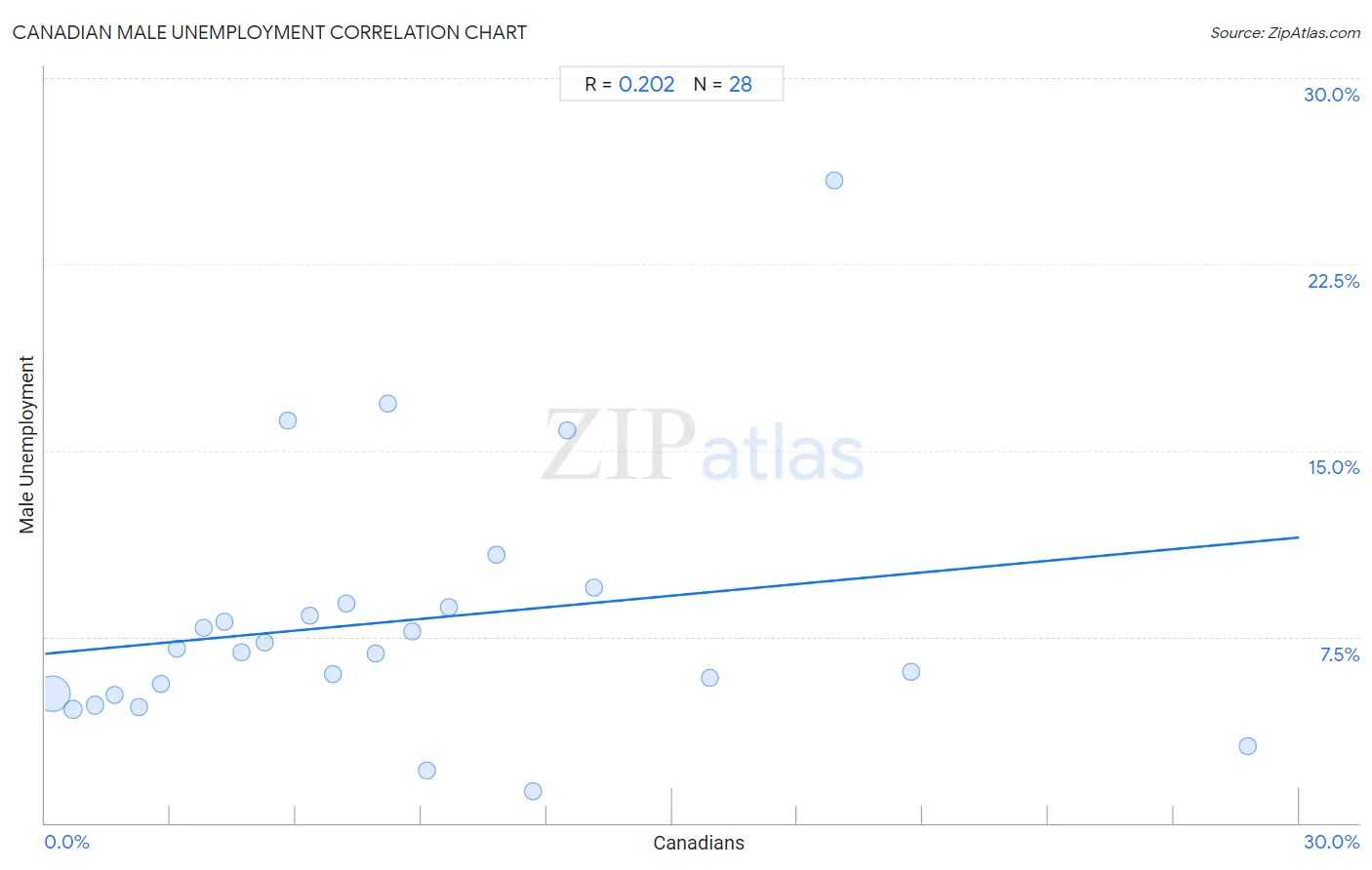Canadian Male Unemployment
COMPARE
Canadian
Select to Compare
Male Unemployment
Canadian Male Unemployment
5.1%
UNEMPLOYMENT | MALES
94.1/ 100
METRIC RATING
94th/ 347
METRIC RANK
Canadian Male Unemployment Correlation Chart
The statistical analysis conducted on geographies consisting of 434,702,857 people shows a weak positive correlation between the proportion of Canadians and unemployment rate among males in the United States with a correlation coefficient (R) of 0.202 and weighted average of 5.1%. On average, for every 1% (one percent) increase in Canadians within a typical geography, there is an increase of 0.16% in unemployment rate among males.

It is essential to understand that the correlation between the percentage of Canadians and unemployment rate among males does not imply a direct cause-and-effect relationship. It remains uncertain whether the presence of Canadians influences an upward or downward trend in the level of unemployment rate among males within an area, or if Canadians simply ended up residing in those areas with higher or lower levels of unemployment rate among males due to other factors.
Demographics Similar to Canadians by Male Unemployment
In terms of male unemployment, the demographic groups most similar to Canadians are Slavic (5.1%, a difference of 0.050%), Immigrants from Serbia (5.1%, a difference of 0.050%), Italian (5.1%, a difference of 0.080%), Immigrants from Turkey (5.1%, a difference of 0.10%), and Asian (5.1%, a difference of 0.10%).
| Demographics | Rating | Rank | Male Unemployment |
| Immigrants from Romania | 95.4 /100 | #87 | Exceptional 5.1% |
| Immigrants from Sri Lanka | 94.9 /100 | #88 | Exceptional 5.1% |
| Immigrants from Australia | 94.7 /100 | #89 | Exceptional 5.1% |
| Okinawans | 94.7 /100 | #90 | Exceptional 5.1% |
| Immigrants from Turkey | 94.4 /100 | #91 | Exceptional 5.1% |
| Slavs | 94.2 /100 | #92 | Exceptional 5.1% |
| Immigrants from Serbia | 94.2 /100 | #93 | Exceptional 5.1% |
| Canadians | 94.1 /100 | #94 | Exceptional 5.1% |
| Italians | 93.8 /100 | #95 | Exceptional 5.1% |
| Asians | 93.7 /100 | #96 | Exceptional 5.1% |
| Immigrants from Spain | 93.4 /100 | #97 | Exceptional 5.1% |
| Immigrants from Kuwait | 93.3 /100 | #98 | Exceptional 5.1% |
| Uruguayans | 93.0 /100 | #99 | Exceptional 5.1% |
| Russians | 92.9 /100 | #100 | Exceptional 5.1% |
| German Russians | 92.7 /100 | #101 | Exceptional 5.1% |
Canadian Male Unemployment Correlation Summary
| Measurement | Canadian Data | Male Unemployment Data |
| Minimum | 0.16% | 1.3% |
| Maximum | 28.8% | 25.9% |
| Range | 28.6% | 24.6% |
| Mean | 8.3% | 8.1% |
| Median | 7.0% | 7.0% |
| Interquartile 25% (IQ1) | 3.5% | 5.2% |
| Interquartile 75% (IQ3) | 11.2% | 8.8% |
| Interquartile Range (IQR) | 7.8% | 3.6% |
| Standard Deviation (Sample) | 6.6% | 5.1% |
| Standard Deviation (Population) | 6.5% | 5.1% |
Correlation Details
| Canadian Percentile | Sample Size | Male Unemployment |
[ 0.0% - 0.5% ] 0.16% | 392,092,538 | 5.2% |
[ 0.5% - 1.0% ] 0.67% | 33,952,706 | 4.6% |
[ 1.0% - 1.5% ] 1.19% | 5,435,355 | 4.7% |
[ 1.5% - 2.0% ] 1.67% | 1,851,334 | 5.1% |
[ 2.0% - 2.5% ] 2.24% | 666,518 | 4.7% |
[ 2.5% - 3.0% ] 2.76% | 240,080 | 5.6% |
[ 3.0% - 3.5% ] 3.15% | 152,081 | 7.0% |
[ 3.5% - 4.0% ] 3.80% | 122,641 | 7.8% |
[ 4.0% - 4.5% ] 4.29% | 54,005 | 8.1% |
[ 4.5% - 5.0% ] 4.69% | 41,023 | 6.9% |
[ 5.0% - 5.5% ] 5.26% | 9,440 | 7.3% |
[ 5.5% - 6.0% ] 5.82% | 15,396 | 16.2% |
[ 6.0% - 6.5% ] 6.34% | 35,164 | 8.4% |
[ 6.5% - 7.0% ] 6.88% | 4,725 | 6.0% |
[ 7.0% - 7.5% ] 7.22% | 4,199 | 8.8% |
[ 7.5% - 8.0% ] 7.90% | 873 | 6.8% |
[ 8.0% - 8.5% ] 8.19% | 2,845 | 16.9% |
[ 8.5% - 9.0% ] 8.78% | 8,499 | 7.7% |
[ 9.0% - 9.5% ] 9.13% | 2,498 | 2.1% |
[ 9.5% - 10.0% ] 9.65% | 3,493 | 8.7% |
[ 10.5% - 11.0% ] 10.79% | 1,566 | 10.8% |
[ 11.5% - 12.0% ] 11.67% | 1,585 | 1.3% |
[ 12.0% - 12.5% ] 12.48% | 1,610 | 15.8% |
[ 13.0% - 13.5% ] 13.13% | 99 | 9.5% |
[ 15.5% - 16.0% ] 15.91% | 2,037 | 5.8% |
[ 18.5% - 19.0% ] 18.89% | 180 | 25.9% |
[ 20.5% - 21.0% ] 20.73% | 82 | 6.1% |
[ 28.5% - 29.0% ] 28.77% | 285 | 3.1% |